This article was medically reviewed by Erik Kramer, DO, MPH. Dr. Erik Kramer is a Board-Certified Primary Care Physician at the University of Colorado. With over 15 years of experience, his clinical interests include obesity and weight management, diabetes care, and preventive care, as well as embracing a holistic approach to primary care. He received his Doctorate in Osteopathic Medicine (D.O.) from the Touro University Nevada College of Osteopathic Medicine and completed his residency at Central Maine Medical Center. Dr. Kramer is a Diplomate of the American Board of Obesity Medicine.
There are 18 references cited in this article, which can be found at the bottom of the page.
wikiHow marks an article as reader-approved once it receives enough positive feedback. This article has 19 testimonials from our readers, earning it our reader-approved status.
This article has been viewed 1,182,530 times.
Does coughing keep you up at night, even though you don't have a cold? There are lots of factors that lead to nightly coughing. This wikiHow will give you some tips on how to put a stop to it.
Steps
Adjusting Your Sleep Habits
-
1Sleep on an incline. Prop yourself on pillows before you go to sleep, and try to sleep on more than one pillow. This will prevent all the postnasal drainage and mucus you swallow during the day from backing up in your throat when you lie down at night.[1]
- You can also place wooden blocks under the head of your bed to raise it by 4 inches (10 cm). This angle will help to keep acids down in your stomach so they won’t irritate your throat.
- If possible, avoid sleeping on your back, as this can put strain on your breathing at night and cause you to cough.[2]
- Sleeping on an incline with increased number of pillows is the best way to cure a cough from congestive heart failure (CHF) at night. The water collects in the lower lung fields and does not affect breathing.
-
2Have a hot shower or bath before bed. Dry airways can make your coughing worse at night. So, immerse yourself in a steamy bathroom and soak up some moisture before bed.[3]
- If you have asthma, steam can make your cough worse. Do not try this remedy if you have asthma.
Advertisement -
3Avoid sleeping under a fan or air conditioner. Cold air blowing on your face at night will only make your coughing worse.[4] Move your bed so it is not under an air conditioner. If you keep a fan on in your room at night, move it to a spot where the air won’t blow directly over your face.
- Hot, dry air from a heater can also irritate your throat, so avoid sleeping under heating vents as well.[5]
-
4Place a humidifier in your bedroom. Humidifiers can help keep the air moist, rather than dry, in your room. The steam opens airways and allows for better air flow. This moisture will help to keep your airways moist and make you less prone to coughing.[6]
- Keep the humidity levels at 40% to 50%, as dust mites and mold thrive in damp air. To measure humidity in your bedroom, pick up a hygrometer at your local hardware store.
-
5Wash your bedding at least once a week. If you have a persistent night cough and are prone to allergies, keep your bedding clean. Dust mites, tiny creatures that eat dead flakes of skin, live in bedding and are a common allergy trigger. If you have an allergy or asthma you may be at risk for dust mites. Make sure to wash your sheets and try using sheet covers for the bed.[7]
- Wash all your bedding, from your sheets and pillowcases to your duvet cover, in hot water once a week.
- You can also wrap your mattress in plastic to keep dust mites away and your bedding clean, or purchase anti-allergen mattress and pillow covers.
-
6Keep a glass of water on your bedside table. This way, if you wake up with a coughing fit during the night, you can clear your throat with a long sip of water. Warm fluids are even more soothing, so you might sip on hot tea or warm water with honey and lemon.[8]
- Drinking water or warm fluids can help loosen mucus that might cause nighttime coughing, and it also soothes soreness or scratchiness in your throat.
-
7Try to breathe through your nose when you sleep. Before you go to sleep, think of the proverb: “The nose is for breathing, the mouth is for eating.” Train yourself to breathe through your nose as you sleep by doing several rounds of conscious nose breathing. This will put less stress on your throat and hopefully lead to less coughing at night.[9]
- Sit up straight in a comfortable position.
- Relax your upper body and close your mouth. Rest your tongue behind your bottom teeth, away from the top of your mouth.
- Place your hands on your diaphragm, or your lower belly area. You should try to breath from your diaphragm, rather than from your chest area. Breathing from your diaphragm is important because it helps your lungs with gas exchange and it massages your liver, stomach, and intestines, working the toxins out of these organs. It will also relax your upper body.
- Take a deep breath in with your nose and inhale for 2 to 3 seconds.
- Exhale through your nose or your pursed lips for 3 to 4 seconds. Pause for 2 to 3 seconds and breathe in again through your nose.
- Practice breathing like this through your nose for several rounds of breaths. Extending your inhales and exhales will help your body get used to breathing through your nose, rather than your mouth.
Using Professional Remedies
-
1Take over-the-counter cough medicine. Over-the-counter cough medicine can help in 2 ways. An expectorant, like Mucinex DM, helps to loosen mucus and phlegm in your throat and airways. This kind of medication is ideal if you have a productive or phlegmy cough. A cough suppressant, like Delsym, blocks your body’s cough reflex and reduces your body’s urge to cough. These are better for dry or non-productive coughs.[10]
- You can also take basic cough syrup or apply Vick’s Vapor Rub on your chest before bed. Both medicines are known to help reduce coughing at night.
- Read the label of the medicine before you use it. Ask your pharmacist if you are not sure which type of over-the-counter cough medicine is right for your cough.
-
2Use cough lozenges. Some cough drops use a numbing ingredient, like benzocaine, which can help to calm down your cough long enough to help you fall asleep. If you have a dry cough, you can also look for cough drops with antitussives (cough suppressants) like dextromethorphan.[11]
-
3Talk to your doctor if your cough does not go away after 7 days. If your nighttime cough gets worse after several treatments or remedies or doesn’t get better after 7 days, see your doctor. Causes of a cough at night include asthma, the common cold, GERD, taking ACE inhibitors, a viral syndrome, or chronic bronchitis. Some conditions, like bronchiectasis or cancer, may cause you to cough constantly throughout the day and night. If you have a high fever and a chronic night cough, see your doctor as soon as possible.[12]
- The evaluation of a chronic cough begins with a good history and physical. The doctor may want to order a chest x-ray to see if there is underlying pathology. Other tests for GERD and asthma may be necessary. These include pulmonary function testing for asthma and possibly an endoscopy for GERD.
- Depending on your diagnosis, your doctor may prescribe a decongestant or a more serious medical treatment. If you already have a more serious medical issue that causes you to cough at night, such as asthma or persistent colds, talk to your doctor about specific medication you can take to treat this symptom. Dextromethorphan, morphine, guaifenesin, and gabapentin may be prescribed.
- Talk to your doctor if you are taking an ACE Inhibitor, since coughing can be a side effect. They can put you on an ARB instead, which has the same benefits, without the side effect of coughing.
- Some coughs, especially if they are persistent and chronic, can be a symptom of a more serious illness, like heart disease, tuberculosis, and lung cancer. However, these diseases usually also come with other more pronounced symptoms, like coughing up blood or a history of existing heart problems.[13]
Using Natural Remedies
-
1Have a spoonful of honey before bed. Honey is a great natural remedy for an irritated throat, as it coats and soothes the mucous membranes in your throat. Honey also has antibacterial properties, thanks to an enzyme added by bees. So if your cough is due to a bacterial illness, honey can help to fight off bad bacteria.[14]
- Take 1 tablespoon (15 mL) of organic, raw honey 1 to 3 times a day and before bed. You can also dissolve honey in a cup of hot water with lemon and drink it before bed.
- Give children 1 teaspoon (4.9 mL) of honey 1 to 3 times a day and before bed.
- You should never give children under the age of 2 years honey due to the risk of botulism, a bacterial infection.
-
2Try saline irrigation at bedtime if you have a post-nasal drip. Mucus dripping down the back of your throat is a common cause of nighttime coughing. Rinsing your nasal passages with saline before you go to sleep may help.[15] Buy a saline nasal rinse at your local drugstore and follow the instructions on the packaging to use the rinse. This usually involves pouring or squeezing the liquid into one nostril while tilting your head to the side, so that it flows out the other nostril.[16]
- If you prefer, you can make your own saline nasal spray or rinse. You’ll need a syringe, spray bottle, or squeeze bulb to administer it.
- For a stubborn postnasal drip that doesn’t respond to saline spray, your doctor might recommend a medicated nasal spray, such as a nasal steroid or decongestant.[17]
-
3Drink licorice root tea. Licorice root is a natural decongestant. It soothes your airways and loosens mucus in your throat. It also soothes any inflammation in your throat.[18]
- Look for dried licorice root at your local health food store. You can also buy licorice root in tea bags in the tea aisle of most grocery stores.
- Steep the licorice root in hot water for 10-15 minutes, or as specified on the tea bags. Cover the tea as it steeps to trap the steam and oils from the tea. Drink the tea 1 to 2 times a day and before bed.
- If you are on steroids or have problems with your kidneys, do not consume licorice root.
-
4Gargle salt water. Salt water can ease discomfort in your throat and clear out any mucus. If you are congested and have a cough, gargling salt water can help to dislodge any phlegm in your throat.[19]
- Stir 1/4-1/2 teaspoon (1.4-2.8 g) of salt in 8 fluid ounces (240 mL) of warm water until it is dissolved.
- Gargle the salt water for 15 seconds, being careful not to swallow any of the salt water.
- Spit the water out in the sink and gargle again with the remaining salt water.
- Rinse your mouth with plain water once you are done gargling.
-
5Steam your face with water and natural oils. Steam is a great way to absorb moisture through your nasal passages and prevent a dry cough. Adding essential oils like tea tree oil and eucalyptus oils may also give you anti-viral, anti-bacterial, and anti-inflammatory benefits.[20]
- Boil enough water to fill a medium sized, heat-proof bowl. Pour the water into the bowl and let it cool for 30-60 seconds.
- Add 3 drops of tea tree oil and 1 to 2 drops of eucalyptus oil to the bowl of water. Give the water a quick stir to release the vapors.
- Lean your head over the bowl and try to get as close to the steam as possible. Not too close though, as steam can burn your skin. Place a clean towel over your head, like a tent, to trap the steam. Breath in deeply for 5 to 10 minutes. Try to steam with essential oils 2 to 3 times a day.
- You can also rub essential oils on your chest or your child’s chest to prevent coughing at night. Always mix essential oils in organic olive oil before applying it to your skin, as essential oils should never be applied directly to the skin. An essential oil chest rub will work as well as Vick’s Vapor Rub but will be free of petrochemicals and all-natural. For children younger than 10, check the label on the essential oils for safety notes or warnings.
Expert Q&A
-
QuestionI have been to the doctor and they said it's just a virus, but I'm almost sick every night. What should I do?
 Chris M. Matsko, MDDr. Chris M. Matsko is a retired physician based in Pittsburgh, Pennsylvania. With over 25 years of medical research experience, Dr. Matsko was awarded the Pittsburgh Cornell University Leadership Award for Excellence. He holds a BS in Nutritional Science from Cornell University and an MD from the Temple University School of Medicine in 2007. Dr. Matsko earned a Research Writing Certification from the American Medical Writers Association (AMWA) in 2016 and a Medical Writing & Editing Certification from the University of Chicago in 2017.
Chris M. Matsko, MDDr. Chris M. Matsko is a retired physician based in Pittsburgh, Pennsylvania. With over 25 years of medical research experience, Dr. Matsko was awarded the Pittsburgh Cornell University Leadership Award for Excellence. He holds a BS in Nutritional Science from Cornell University and an MD from the Temple University School of Medicine in 2007. Dr. Matsko earned a Research Writing Certification from the American Medical Writers Association (AMWA) in 2016 and a Medical Writing & Editing Certification from the University of Chicago in 2017.
Family Medicine Physician If you have night time fevers and a cough, you may have tuberculosis. Get a PPD test.
If you have night time fevers and a cough, you may have tuberculosis. Get a PPD test. -
QuestionHow do I treat my asthma at night?
 Chris M. Matsko, MDDr. Chris M. Matsko is a retired physician based in Pittsburgh, Pennsylvania. With over 25 years of medical research experience, Dr. Matsko was awarded the Pittsburgh Cornell University Leadership Award for Excellence. He holds a BS in Nutritional Science from Cornell University and an MD from the Temple University School of Medicine in 2007. Dr. Matsko earned a Research Writing Certification from the American Medical Writers Association (AMWA) in 2016 and a Medical Writing & Editing Certification from the University of Chicago in 2017.
Chris M. Matsko, MDDr. Chris M. Matsko is a retired physician based in Pittsburgh, Pennsylvania. With over 25 years of medical research experience, Dr. Matsko was awarded the Pittsburgh Cornell University Leadership Award for Excellence. He holds a BS in Nutritional Science from Cornell University and an MD from the Temple University School of Medicine in 2007. Dr. Matsko earned a Research Writing Certification from the American Medical Writers Association (AMWA) in 2016 and a Medical Writing & Editing Certification from the University of Chicago in 2017.
Family Medicine Physician You will need to use a long-acting beta agonist inhaler and a corticosteroid inhaler if you are having increasing night time symptoms. Night time symptoms are the main prognostic indicator of how bad your asthma presents.
You will need to use a long-acting beta agonist inhaler and a corticosteroid inhaler if you are having increasing night time symptoms. Night time symptoms are the main prognostic indicator of how bad your asthma presents. -
QuestionI've been having a dry cough and my chest is usually congested at night, but I also have asthma. What do I do?
 Erik Kramer, DO, MPHDr. Erik Kramer is a Board-Certified Primary Care Physician at the University of Colorado. With over 15 years of experience, his clinical interests include obesity and weight management, diabetes care, and preventive care, as well as embracing a holistic approach to primary care. He received his Doctorate in Osteopathic Medicine (D.O.) from the Touro University Nevada College of Osteopathic Medicine and completed his residency at Central Maine Medical Center. Dr. Kramer is a Diplomate of the American Board of Obesity Medicine.
Erik Kramer, DO, MPHDr. Erik Kramer is a Board-Certified Primary Care Physician at the University of Colorado. With over 15 years of experience, his clinical interests include obesity and weight management, diabetes care, and preventive care, as well as embracing a holistic approach to primary care. He received his Doctorate in Osteopathic Medicine (D.O.) from the Touro University Nevada College of Osteopathic Medicine and completed his residency at Central Maine Medical Center. Dr. Kramer is a Diplomate of the American Board of Obesity Medicine.
Doctor of Osteopathic Medicine Follow up with your medical provider to reassess your inhaler management and make appropriate changes. Your nighttime cough should resolve when your asthma is managed well.
Follow up with your medical provider to reassess your inhaler management and make appropriate changes. Your nighttime cough should resolve when your asthma is managed well.
References
- ↑ http://www.ncbi.nlm.nih.gov/pmc/articles/PMC2669040/
- ↑ http://www.normalbreathing.com/stop-cough-at-night.php
- ↑ https://www.sleep.org/6-ways-sleep-off-cold/
- ↑ https://www.health.harvard.edu/staying-healthy/that-nagging-cough
- ↑ https://health.clevelandclinic.org/can-best-combat-effects-dry-winter-air/
- ↑ https://kidshealth.org/en/parents/childs-cough.html
- ↑ https://www.aafa.org/dust-mite-allergy/
- ↑ https://www.mayoclinic.org/diseases-conditions/common-cold/in-depth/cold-remedies/art-20046403
- ↑ https://copd.net/living/learning-breathe-right-is-the-hardest-of-all/
- ↑ http://www.health.harvard.edu/staying-healthy/that-nagging-cough
- ↑ http://pennstatehershey.adam.com/content.aspx?productid=112&pid=28&gid=000029
- ↑ http://www.nhs.uk/conditions/cough/pages/introduction.aspx
- ↑ http://www.health.harvard.edu/staying-healthy/that-nagging-cough
- ↑ http://www.mayoclinic.org/diseases-conditions/common-cold/expert-answers/honey/faq-20058031
- ↑ https://www.ncbi.nlm.nih.gov/books/NBK532273/
- ↑ https://medlineplus.gov/ency/patientinstructions/000801.htm
- ↑ https://www.health.harvard.edu/staying-healthy/treatments-for-post-nasal-drip
- ↑ https://www.ncbi.nlm.nih.gov/pmc/articles/PMC7167772/
- ↑ https://www.mayoclinic.org/diseases-conditions/common-cold/in-depth/cold-remedies/art-20046403
- ↑ https://onlinelibrary.wiley.com/doi/full/10.1002/ffj.3252
About This Article
The best way to stop coughing at night is to sleep on a 4 inch incline. Take a hot shower every night before bed, and wash your bedding once a week to remove all dust. Read on for more suggestions from our Medical reviewer, including medical and natural remedies!
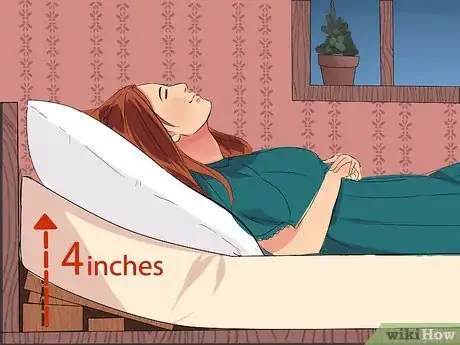

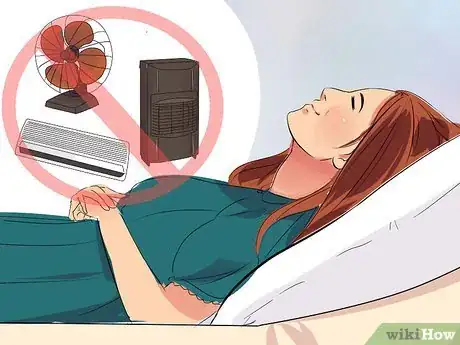
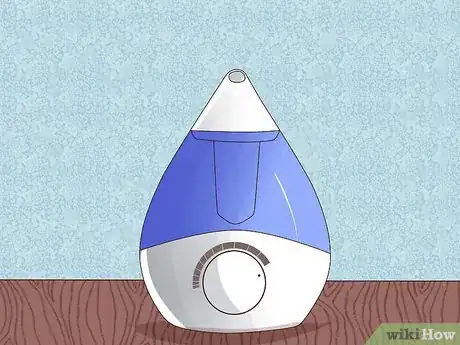


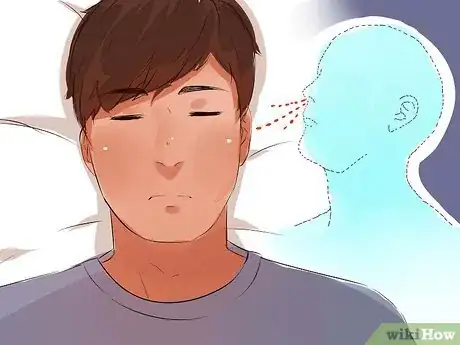





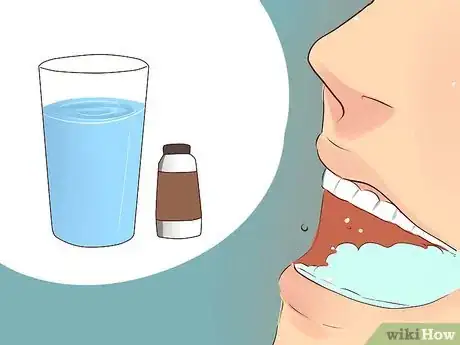



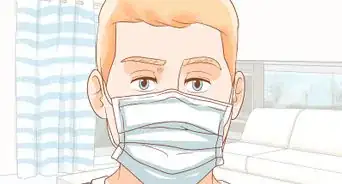
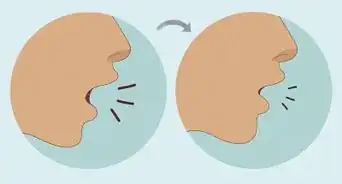




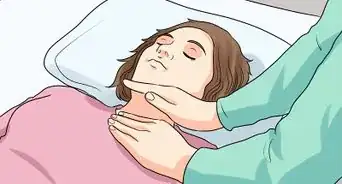



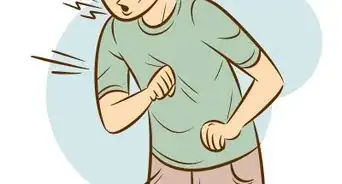











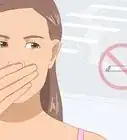
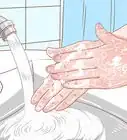
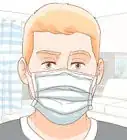




































Medical Disclaimer
The content of this article is not intended to be a substitute for professional medical advice, examination, diagnosis, or treatment. You should always contact your doctor or other qualified healthcare professional before starting, changing, or stopping any kind of health treatment.
Read More...